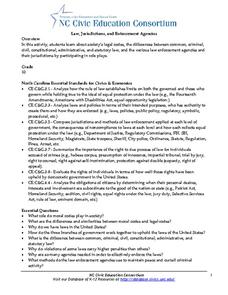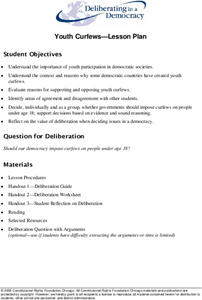Carolina K-12
Law, Jurisdictions, and Enforcement Agencies
How do you determine what law enforcement agency has jurisdiction when a crime has been committed? That's the challenge facing class members in this role-play activity.
Personal Genetics Education Project
DNA, Crime and Law Enforcement
Civil rights meets biotechnology in a instructional activity that scrutinizes the collection of DNA of citizens who have been arrested, but not yet convicted of a crime. Real-life cases are examined in which the DNA of a relative was...
Constitutional Rights Foundation
Immigration Enforcement Raids
Class groups take on the role of advisors to the Assistant Secretary of the Office of Policy & Planning of ICE. Their charge is to prepare a report for the secretary on the effectiveness of enforcement actions of the ICE in stemming...
Deliberating in a Democracy
Parental Liability
How many teenagers have wanted their parents to let them make their own decisions? The answer is ... all of them! Scholars investigate where parental liability begins and ends in the eyes of the law. Using case studies and legal...
Judicial Learning Center
State Courts vs. Federal Courts
Popular culture often portrays the Feds as the most fearsome of law enforcement agencies. Yet, someone charged with a crime is considerably more likely to end up in a state court. The lesson, one of six covering the Organization of the...
Constitutional Rights Foundation
Arizona v. United States — States and Immigration Law
As part of a study of immigration law, class members read a summary of the Supreme Court case, Arizona v. United States. They then examine a series of examples and acting as federal court judges, must determine if the scenarios meet the...
Facing History and Ourselves
The Importance of a Free Press
"Congress shall make no law . . . abridging the freedom of speech, or of the press;. . ." Why is this guarantee of free speech and a free press the First Amendment to the US Constitution? Why are these rights so essential to a democracy?...
California Department of Education
Hazards in the Workplace
Safety first! Safety first! A short video and a PowerPoint presentation introduce job seekers to child labor law awareness, safety standards, and ways to reduce workplace injuries. Class members first take a short workplace safety quiz...
iCivics
A Very Big Branch
Through detailed secondary source reading material and an interactive "true/false" activity, learners discover the depth and complexity of the executive branch in the United States government. Topics covered include executive...
Equality and Human Rights Commission
How Do Human Rights Work?
Do human rights apply to children? Scholars learn of three children asking for help to determine their rights and how to handle specific situations. Class members must research any laws pertaining to the requested right and how the...
Newseum
When Tragedy Hits — Role-Playing a Breaking News Story
Young journalists engage in a role-playing exercise that asks them to consider the journalism and ethical issues raised by the coverage of the mass shootings at Virginia Tech on April 16, 2007. Pupils play the role of either a reporter...
Anti-Defamation League
Exploring Solutions to Address Radical Disparity Concerns
The deaths of Michael Brown, Eric Garner, and Tamir Rice, and the protests that followed the 2014 shootings, are the focus of a current-events activity that asks class members to brainstorm and research possible strategies to address the...
PBS
Stories of Painkiller Addiction: Prescription Drug Abuse Awareness Campaign
The I-STOP law was designed to regulate the distribution and tracking of prescription drugs. After reading an article about its signing and implementation, middle and high schoolers work together to come up with their own ideas for an...
Deliberating in a Democracy
Surveillance
Big Brother is always watching you! Scholars analyze the impact security cameras have on the legal system in a democracy. Primary documentation, case studies, and video clips investigate the use of video in prosecution and provide an...
PBS
Who, Me? Biased?: Understanding Implicit Bias
A 10-page interactive explains different facets of implicit bias, demonstrates how implicit bias works, and how people can counteract its effects. The interactive tools permit users to save their information in "My Work" folders, to take...
Youth Outreach
Connecting the Separate Powers
Scholars demonstrate what they know about the separation of powers through role play. Two individuals act out a skit as the remaining class members discuss and decide whether the interaction they observed is an appropriate example of the...
Constitutional Rights Foundation
Educating About Immigration The DREAM Act
Group members role play state legislators, supporters of and opponents to the The DREAM Act (Development, Relief, and Education for Alien Minors). After listening to the arguments put forth for and against the immigration legislation,...
Deliberating in a Democracy
Youth Curfews
Don't stay out too late! Scholars analyze the need for youth curfews in a democratic society. They examine primary documents, case studies, and short video clips to form their opinions and take a position on the issue. Holding a class...
Deliberating in a Democracy
Juvenile Justice
Pupils compare and contrast the legal system as it pertains to juvenile and adult crime and punishment. Incorporating primary documents, legal decisions, and video evidence, individuals form an argument debating the treatment of...
Utah State Courts
Judges in the Classroom
Class members explore the process of a disposition hearing for juveniles, particularly looking at how the judge decides what sentence the juvenile offender should receive. Task your pupils with evaluating different sample cases provided...
Judicial Learning Center
Your 4th Amendment Rights
Americans love to learn about their rights, especially those that protect them from the government's power to invade their privacy. Young people are especially engaged by this topic. An informative lesson explores four Supreme Court...
Digital History
The Crisis of 1833: Tariffs and Nullification
This resource offers a detailed review of the events that led South Carolina to nullify the Tariffs of 1828 and 1832, as well as to pass the Nullification Ordinance, which questioned the federal government's authority to enforce any law...
C-SPAN
14th Amendment Equal Protection Clause
Two Supreme Court cases, Plessy v. Ferguson and Brown v. Board of Education take center stage in a lesson about the Equal Protection Clause of the 14th Amendment. Class members research both cases to compare and contrast the rulings.
State Bar of Texas
Worcester v. Georgia
Can the president of the United States defy the rulings of the Supreme Court? Students investigate the case of Worcester v. Georgia and the impact it had on society and, most importantly, Native Americans. Using a short video clip as...
Other popular searches
- Police and Law Enforcement
- History of Law Enforcement
- Law Enforcement Lesson Plans
- Law Enforcement Procedures
- Law Enforcement Careers
- Careers in Law Enforcement
- Algebra in Law Enforcement
- Crime Versus Law Enforcement
- Law Enforcement Surveillance
- Law Enforcement Officer
- Law Enforcement Oc Spray

























